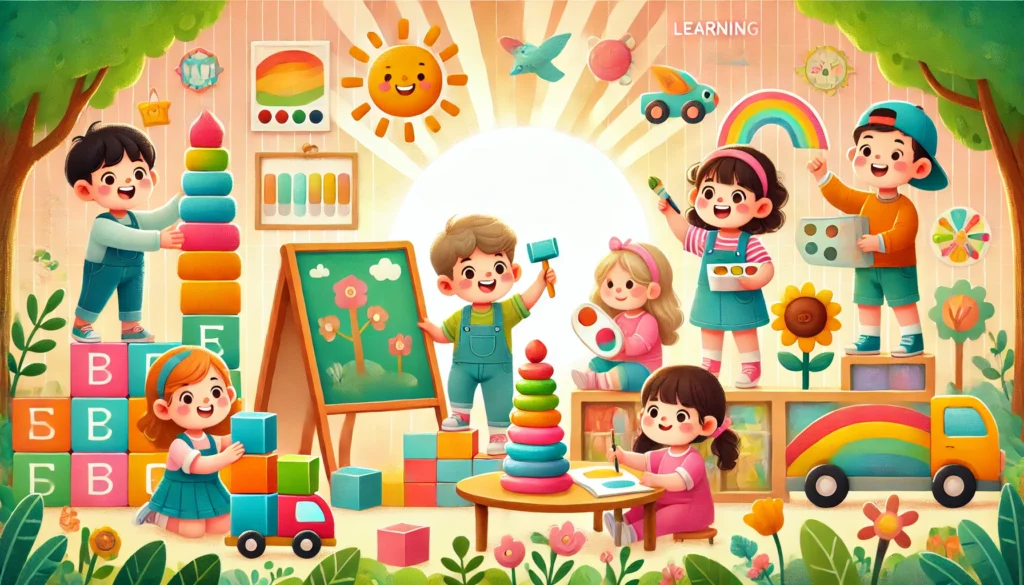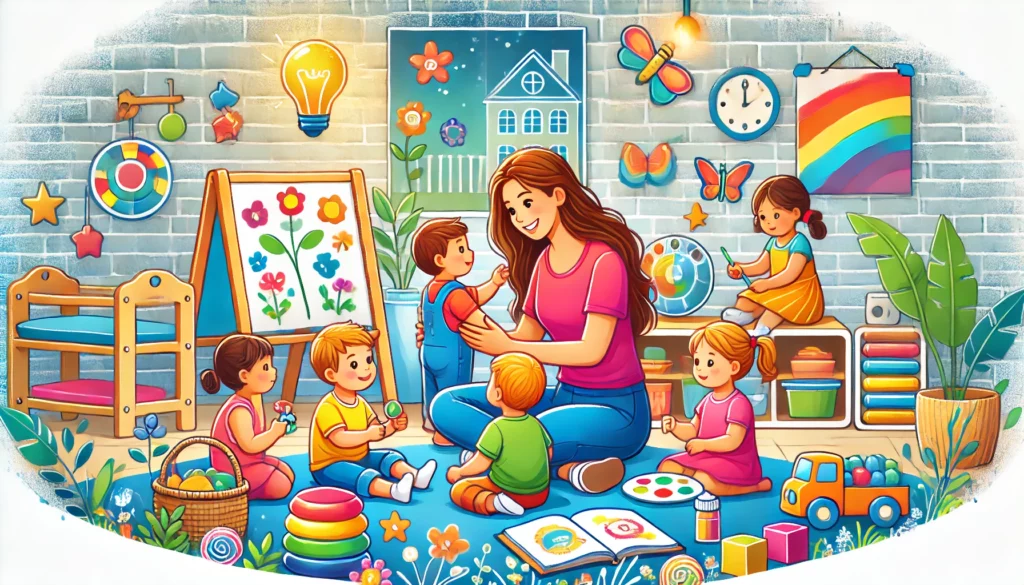EYFS Development Matters: How to Support Your Child’s Growth
EYFS Development Matters is a non-statutory guidance document designed to support early years practitioners in delivering the EYFS framework. Unlike a rigid assessment system, it provides a flexible approach to tracking children’s progress and planning learning activities based on their development stages. As a result, EYFS Development Matters plays a key role in shaping how young children learn and grow.
The Early Years Foundation Stage (EYFS) is a comprehensive framework that supports children’s education from birth to five years old. By providing clear guidance for schools, nurseries, and childminders, it ensures that every child receives a high-quality early education.
Additionally, the EYFS statutory framework sets the legal standards for learning, development, and care in early years settings. This structured approach helps practitioners create a supportive environment where children can thrive. Many parents often ask, “What does EYFS stand for?” Simply put, it stands for the Early Years Foundation Stage, the foundation of early childhood education in the UK.
Within the EYFS curriculum, EYFS Development Matters serves as a practical guide for educators. Not only does it help track children’s progress, but it also supports planning activities that nurture key areas of development. For parents, understanding this framework means they can actively support their child’s learning at home.
This guide will explain how EYFS Development Matters works and how you can use it to help your child grow with confidence.

Understanding EYFS Development Matters
Development Matters EYFS is a key guidance document that helps early years practitioners understand and support children’s learning. It is not just a checklist but rather a flexible framework designed to track progress and shape learning experiences. By following the EYFS framework development matters, educators can effectively assess children’s development and provide the right support at each stage.
Furthermore, the guidance is closely linked to the Early Learning Goals EYFS, which outline what children should know and be able to do by the end of the EYFS. As a result, it helps practitioners plan activities that build essential skills while also allowing children to explore and learn at their own pace.
One of the key focuses of Development Matters EYFS is learning through play. Through hands-on activities, children develop communication, problem-solving, and social skills. For example, structured play, such as storytelling, creative arts, and group discussions, supports cognitive and emotional growth. Moreover, these activities align with the EYFS development stages, ensuring that each child progresses in a way that suits their individual needs.
In addition, the EYFS curriculum encourages a holistic approach, allowing educators and parents to nurture a child’s curiosity and independence. By incorporating Development Matters EYFS, practitioners can create meaningful learning experiences that not only prepare children for future education but also make learning fun and engaging.
EYFS Framework Explained: What It Covers and Why It Matters
In Reality, the EYFS framework is the foundation of early childhood education in the UK. It plays a crucial role in ensuring that children receive high-quality learning experiences from birth to five years old. More importantly, this framework provides structure, helping early years practitioners create a safe, engaging, and supportive environment for young learners.
Moreover, the EYFS statutory framework outlines the legal requirements for early years settings, including nurseries, childminders, and preschools. By following these guidelines, practitioners ensure that all children have equal opportunities to develop essential skills, ultimately preparing them for primary school. Additionally, it covers learning areas, assessments, and safeguarding measures to support a child’s overall well-being.
A key component of this framework includes the 5 principles of the Early Years Learning Framework, which focus on creating a nurturing, inclusive, and engaging learning environment:
- Secure, respectful, and reciprocal relationships – Encouraging positive interactions between children, educators, and families.
- Partnerships with families – Involving parents in their child’s learning journey to support development.
- High expectations and equity – Ensuring every child has access to opportunities that help them reach their full potential.
- Respect for diversity – Teaching children to appreciate different cultures, backgrounds, and perspectives.
- Ongoing learning and reflective practice – Helping educators continuously improve their approach to early childhood education.
The principles of the Early Years Learning Framework guide both early years practitioners and parents in creating a supportive environment where children feel safe, confident, and eager to learn. These principles ensure that every child receives the best possible start in life.

Key Components of the EYFS Curriculum
Firstly, the EYFS curriculum is designed to help children develop essential skills through structured learning and play. It focuses on key areas of development, ensuring children are well-prepared for future education. Accordingly, early years settings follow this framework to provide high-quality learning experiences that support children’s growth.
Areas of Learning in the EYFS Curriculum
The early years framework outlines seven areas of learning, divided into two main categories:
Prime Areas – These lay the foundation for all future learning:
- Communication and Language – Developing listening, speaking, and understanding skills.
- Physical Development – Improving movement, coordination, and healthy habits.
- Personal, Social, and Emotional Development – Building confidence, social skills, and emotional resilience.
Specific Areas – These focus on subject-related knowledge:
- Literacy – Learning to read and write.
- Mathematics – Understanding numbers, shapes, and problem-solving.
- Understanding the World – Exploring different cultures, nature, and technology.
- Expressive Arts and Design – Encouraging creativity through music, art, and imaginative play.
How the EYFS Framework Supports Early Learning
In other words, the Early Learning Goals EYFS set expectations for what children should achieve by the end of the EYFS. These goals help early years practitioners assess progress and identify areas where children need extra support. While children develop at different rates, the EYFS development matters framework ensures that learning is tailored to their needs.
Consequently, by following the EYFS curriculum, practitioners and parents can work together to create a positive learning environment. Encouraging play-based learning, exploring new activities, and fostering curiosity help children gain the confidence they need to transition smoothly into primary education.
EYFS Development Stages
Children develop at their own pace, but the EYFS development stages provide a general guide to what parents can expect as their child grows. These stages help parents and educators track progress and support learning in a way that suits each child’s individual needs. In summary, EYDS Development Matters plays a key role in guiding practitioners to assess and nurture development effectively.
EYFS Development Matters: Key EYFS Development Stages
Birth to 3 Years – Early exploration and communication begin.
- Babies and toddlers start responding to voices and facial expressions.
- They learn to crawl, walk, and explore their surroundings.
- Simple social interactions, like waving or pointing, start to develop.
3 to 4 Years – Rapid growth in language, independence, and play.
- Children begin forming sentences and expressing their needs.
- They start playing with others, sharing, and taking turns.
- Fine motor skills improve, helping with drawing and basic writing.
4 to 5 Years – School readiness and confidence grow.
- Vocabulary expands, and children start asking questions about the world.
- They begin recognising letters, numbers, and simple words.
- Problem-solving and imaginative play become more advanced.
How EYFS Development Matters Supports Each Stage
In fact, development Matters EYFS helps early years practitioners track progress and adjust learning activities to match a child’s stage. For example:
If a toddler is struggling with speech, practitioners encourage communication through songs and storytelling.
If a child finds sharing difficult, group activities help them understand turn-taking and cooperation.
For early literacy skills, fun phonics games introduce letters in an engaging way.
Therefore, understanding the EYFS development stages allows parents to support learning at home. For instance, simple activities like reading together, encouraging outdoor play, and having conversations about daily experiences help children build confidence and key skills.

How Parents Can Support Their Child’s Development
As a matter of fact, parents play a vital role in their child’s learning journey. While early years settings follow the EYFS curriculum, learning doesn’t stop in the classroom. Engaging in simple activities at home can reinforce key skills and boost confidence. For example, by using Development Matters EYFS as a guide, parents can support their child’s growth through everyday interactions and play.
Practical Tips for Supporting Learning at Home
Encourage Conversations – Talk to your child about their day, ask open-ended questions, and expand on their ideas to build vocabulary.
Read Together Daily – Storytelling strengthens language skills and helps with early reading development. Let your child choose books and talk about the pictures.
Promote Independent Play – Giving your child time to explore and make choices fosters creativity and problem-solving skills.
Use Everyday Maths – Counting objects, sorting colours, and measuring ingredients while cooking introduce early maths concepts in a fun way.
Get Creative – Drawing, painting, and crafting help develop fine motor skills and self-expression.
The Role of Early Years Practitioners
Additionally, an early years practitioner plays a crucial role in shaping a child’s learning journey. They provide a safe, nurturing environment where children can explore, develop key skills, and gain confidence. Therefore, by following the EYFS framework, practitioners ensure that every child receives high-quality education tailored to their individual needs.
EYFS Development Matters: How Practitioners Support Learning
- Early years practitioners help children develop across all EYFS development stages by:
- Encouraging communication and social skills through storytelling and group activities.
- Supporting physical development with hands-on learning and outdoor play.
- Introducing early literacy and numeracy skills using fun, interactive methods.
- Teaching children about emotions, friendships, and problem-solving.
Using the Early Years Framework and EYFS Development Matters
So, the EYFS statutory framework provides clear guidelines for how early education should be structured. Practitioners use Development Matters EYFS to track progress and adapt activities based on each child’s needs. As a result, this ensures that learning is personalised and engaging.
Planning lessons – Activities are designed around the child’s interests and abilities.
Assessing progress – Observations help practitioners understand how well a child is meeting the Early Learning Goals EYFS.
Providing support – If a child needs extra help, tailored strategies are used to strengthen their development.
After all, by following the EYFS framework, practitioners create a strong foundation for lifelong learning. They work closely with parents to ensure that children receive consistent support both at home and in early years settings.
Conclusion
So, EYFS Development Matters is essential for ensuring that children receive the best start in life. It helps early years practitioners track progress, plan engaging activities, and support learning through play. By following the EYFS development matters framework , educators create a structured yet flexible approach to early education, ensuring that every child develops key skills at their own pace.
As a matter of fact, parents play a vital role in reinforcing these learning experiences at home. Working closely with early years practitioners and understanding the EYFS statutory framework can help parents support their child’s development more effectively. Also, the Early Years Learning Framework emphasises the importance of strong partnerships between educators and families, ensuring that children feel confident and motivated to learn.
Moreover, for extra guidance, Online Early Years Tutors can provide personalised support. Whether helping with early literacy, numeracy, or social skills, professional tutors can make learning fun and accessible.
To sum up, by embracing EYFS Development Matters, parents and educators can work together to create a strong foundation for a child’s future. So, remember that every small step in early learning contributes to lifelong confidence and success.
FAQs
What is EYFS Development Matters?
Development Matters EYFS is a non-statutory guidance that helps early years practitioners track children’s progress and plan learning activities. It supports the EYFS framework development matters approach by providing age-related expectations, but it is flexible—children develop at their own pace.
What are the 4 themes of EYFS?
The EYFS framework is built around four themes that guide early years education:
- A Unique Child – Every child is different and develops at their own pace.
- Positive Relationships – Strong connections with adults and peers help children feel secure.
- Enabling Environments – A well-planned environment encourages exploration and learning.
- Learning and Development – Every child’s learning journey is supported through structured and play-based activities.
What does EYFS stand for?
EYFS stands for Early Years Foundation Stage, the UK’s framework for early childhood education. It applies to children from birth to five years old and ensures high-quality learning experiences in nurseries, preschools, and reception classes.
What is the EYFS method of teaching?
The EYFS method of teaching focuses on play-based learning, where children explore, create, and develop skills through hands-on activities. Practitioners use structured play, storytelling, and real-life experiences to teach concepts in a natural and engaging way. The approach is child-led, allowing children to learn at their own pace while meeting key Early Learning Goals EYFS.
What is the EYFS framework?
The EYFS framework sets out the EYFS statutory framework, which includes learning, assessment, and safeguarding standards for children aged 0-5. It ensures consistency in early years education and helps early years practitioners create environments that support each child’s growth and development.
What are the 7 developmental areas of the EYFS?
The EYFS framework outlines seven key areas of learning, divided into Prime and Specific areas:
Prime Areas
- Communication and Language
- Physical Development
- Personal, Social, and Emotional Development
Specific Areas
4. Literacy
5. Mathematics
6. Understanding the World
7. Expressive Arts and Design








